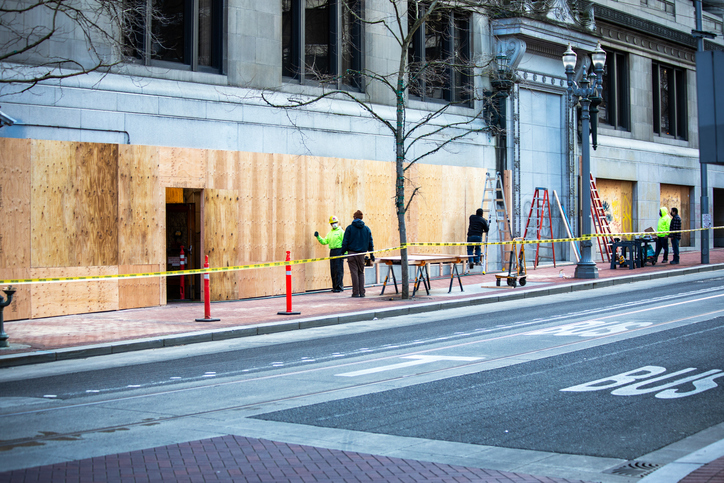Portland attempts to control crime surge and police shortage by banning open drug use, contrary to state law.
By Eileen Griffin
City leaders in Portland, Oregon passed a public drug use ban to reduce lawlessness.
The Portland City Council voted unanimously in favor of an emergency ordinance banning public drug use, The Oregonian reports.
The city ban is deemed unenforceable due to a contrary Oregon state law allowing drug use in public spaces. State law allows the use of hard drugs on public property and forbids cities from restricting public access for drug users.
In 2020, 58 percent of Oregon voters approved Measure 110, which removed penalties for public use of most hard drugs. The measure resulted in drug users remaining on the street. Law enforcement no longer arrests users because there will be no consequence.
Mental Health Issue
The Oregon law treats drug use as an illness and encourages treatment but does not mandate it.
“The people of Oregon further find that a health-based approach to addiction and overdose is more effective, humane and cost-effective than criminal punishments,” the measure reads. “Making people criminals because they suffer from addiction is expensive, ruins lives and can make access to treatment and recovery more difficult.”
Since the passage of Measure 110, Portland has seen a rise in drug use, opioid overdose deaths, homelessness and criminal behavior, Seattle Times reports. The attempt to treat drug addiction as a disease is not effective because drug addicts are not the same as other ill people.
“They are people who often will do just about anything to get high, however irrational, self-destructive or, in some cases, criminal their behavior becomes,” Bret Stephens wrote for the Times. “Addiction may be a disease, but it’s also a lifestyle—one that decriminalization does a lot to facilitate. It’s easier to get high wherever and however you want when the cops are powerless to stop you.”
‘Common-Sense Steps’
Though the state law remains in effect, Portland Mayor Ted Wheeler (D) and City Commissioner of Public Safety Rene Gonzales supported the city ban on drugs in a desperate attempt to try to regain control of the city regardless of the conflict.
“These are necessary, common-sense steps to disrupt debilitating drug use on the streets of Portland that does deep damage to our city’s livability, overwhelms our emergency response system and destroys lives,” Gonzales told The Oregonian.
They are not likely to regain control of the streets anytime soon, a Manhattan Institute study reveals.
“Portland is in the middle of a public safety crisis,” writes Charles Fain Lehman, a Fellow at the Manhattan Institute. “The city set homicide records in the past two years and is facing a wave of shootings that has not yet receded. Property crimes have surged. Public disorder in the form of camping and public drug use, is rampant.”
City Defunded Police
Portland’s problems will not be solved without addressing the law enforcement shortage. Portland was one of the cities that embraced the defund-the-police movement in 2020. Prior to the 2020 defunding, the police department was already short-staffed.
Understaffing has stressed the department for over 20 years, the report says. Compared to other, similar-sized cities, Portland’s staffing has declined since the Great Recession. Then, in 2020, Portland reduced the police budget by $15 million, compounding an existing problem.
“In 2020 there was a concerted push to defund the police,” Lehman told Heartland Daily News. It was a concrete political movement in 2020, but prior to that it (low staffing) may have been unintentional.”
Fewer police on the street definitely significantly impacts the lawlessness, Lehman said.
“We have strong empirical evidence that that police staffing levels are related to the increase in crime,” Lehman said. “One should be against defunding the police but in thinking about the basics of public safety, it’s more of a labor force issue than a public safety issue.”
After the George Floyd murder and subsequent rioting, the city removed $15 million from the budget and reduced the number of police officers by 8 percent. An unprecedented crime wave was the result. Shootings more than doubled. In 2021 and 2022, the city set all-time homicide records.
Blacks Victimized by Crime
Crime disproportionately affects Portland’s black community. One in every 1,000 black resident of Portland was murdered within a year after the Floyd death.
Though the population of black Americans in Portland is low, they become crime victims frequently.
“It’s an absurdly high homicide rate,” Lehman says. “It’s treated as if it’s normal and it shouldn’t be.”
Shrinking City
The mass exodus of people living in Portland will make the situation worse. People and businesses are leaving due to the crime, as Heartland Daily News previously reported.
“Today Portland is one of the fastest-shrinking cities in the United States,” Lehman writes. “As declining population erodes the tax-base and further reduces the city’s capacity to control public disorder.”
There were very few cities that acted on the threat to defund the police, but Portland was one of them.
“There were many cities that did not defund,” Lehman said. “Those who did it—it’s bad for a number of factors. This will have long term impact. It’s more than just the budgeting.”
Portland is taking steps to reverse the downward trend, but it will not be easy, given the years of decline in police staffing and the hurdles the city has in place to hiring. The city has plenty of applicants for police positions, but a large percentage are eliminated due to the background check. Portland police officer candidates must have a clean driving record and they can’t have any recent marijuana use.
Compounding the challenge is a tight labor market and plenty of employment options.
Lehman says when people ask him how to improve levels of police staffing, he tells then, “Pray for a recession.”
For more Rights, Justice, and Culture News.
